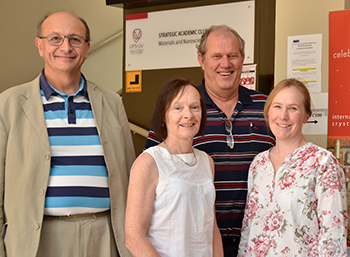Latest News Archive
Please select Category, Year, and then Month to display items
10 March 2022
|
Story Anthony Mthembu
|
Photo Unsplash
 The No Student Hungry team gearing up to start distributing food parcels to the selected students.
The No Student Hungry team gearing up to start distributing food parcels to the selected students.
The UFS is one of the many institutions of higher learning where food insecurity is an active issue. However, the
No Student Hungry Programme is one of the initiatives launched at the university to assist in fighting food insecurity at the institution.
The purpose of the programme
Since its inception in 2011, the initiative has assisted many students in acquiring a healthy meal. Additionally, the Food Environment Office also hands out food packages, so that students can continue to achieve academically. “We are trying to develop a healthy environment for students and make it easier for them to have a nice and healthy meal,” stated Annelize Visagie, who heads the Food Environment Office at the UFS. The Food Environment programme is spread out on all three campuses, each with its own facilitators. Furthermore, the programme mainly caters for students who are not funded by the National Student Financial Aid Scheme (NSFAS) but who are excelling academically. The abovementioned students apply for assistance online, and a list is then drawn up of students who receive assistance for the year.
Alternative solutions to keep the initiative running
On the Bloemfontein Campus, the No Student Hungry Programme will be catering for 200 students in the 2022 academic year, assisting them with a daily nutritious meal. Additional food parcels are also handed out to provide further assistance. “We give food parcels to the students on the list every Tuesday and Thursday at the Thakaneng Bridge,” Visagie highlighted. However, she argues that catering for the student population through this programme can be a challenge, as the demand for assistance is growing rapidly and the ability to assist is limited. The programme relies on partnerships and sponsors to assist the student body. In fact, the coordinators of the programme currently have a memorandum of understanding with Tiger Brands according to which they deliver around 100 food parcels for distribution.
In addition, the coordinators have put in place alternative measures to ensure that they can provide more food to students. “The
Kovsie Act Office, in partnership with the
Department of Sustainable Food Systems and Development, has started a food garden where healthy and nutritious produce are grown, in order to add value to the distribution,” she indicated. Although the programme can only assist to a point, students who are in desperate need of assistance are never turned away. In fact, the
Social Support Unit at Thakaneng Bridge usually assists students with food vouchers for a maximum of four days.
A commitment to teaching healthy eating habits
The programme is not only committed to curbing food insecurity, but also to ensuring that students have a healthy and balanced diet. As such, a booklet is being issued by the
Department of Nutrition and Dietetics in collaboration with the Department of Sustainable Food Systems and Development, which contains ways in which students can make a healthy meal using some of the ingredients offered in the food parcels.
“We want to teach students how to eat healthy in the cheapest way, because they don’t have a lot of money to buy expensive food products,” Visagie argued.
Prestige Scholar hosts Prof John Helliwell of Manchester University
2015-12-08

From left is Prof John R. Helliwell (School of Chemistry, University of Manchester), Dr Madeleine Helliwell (School of Chemistry, University of Manchester), Prof Andre Roodt (Department of Chemistry, University of the Free State) and Dr Alice Brink (Department of Chemistry, University of the Free State).
Photo: Steven Collett |
At the invitation of Dr Alice Brink of the Department of Chemistry, Prof John Helliwell, the 2015 Max Perutz Prize winner, and his wife, Dr Madeleine Helliwell, visited the University of the Free State (UFS).
The Helliwells, both chemists of note, took part in a series of lectures and exchanges on the Bloemfontein and Qwaqwa Campuses.
This visit from 9-19 November 2015 was the consequence of Dr Brink’s participation in the Vice-Chancellor’s Prestige Scholars Programme (PSP) initiative to encourage the broadening of the international footprint of the next generation of scholars in the academy.
Two year collaboration
Dr Brink and Prof Helliwell from Manchester University have a standing collaboration going back two years. Dr Brink, an NRF Thuthuka grant holder and a member of the PSP since 2013, has spent almost eight months in Manchester, collaborating with Prof Helliwell on her study of the successful interaction of rhenium tricarbonyl complexes with proteins determined via protein crystallography.
Their collaboration resulted from the close association of Prof Helliwell and Prof Andre Roodt from the UFS Department of Chemistry, both former presidents of the European Crystallographic Association.
Sharing academic expertise
Prof Helliwell, the 2014 American Crystallographic Association Patterson Award winner for his “pioneering contributions to the global development of the instrumentation, methods and applications of synchrotron radiation in macromolecular crystallography”, gave three lectures in the Department of Chemistry, two on the Boemfontein Campus, and the other on the Qwaqwa Campus on 13 November 2015.
Dr Helliwell, former co-editor of the Acta Crystallographica Section C: Crystal Structure Communications journal, consulted with postgraduate students from the Departments of Chemistry and Biochemistry.